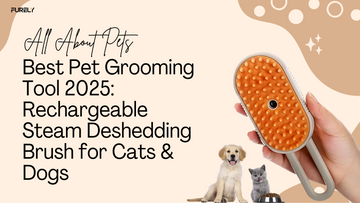
Pet Care:
That's where the nail-catching exercise becomes pure magic(pet care): with loads of patience, the proper tools, and an entire truckload of accolades, it's just one more method they connect with their people and with themselves.
Take it slow, take it slow, and forget about perfection. Perhaps some dogs will just never be fond of nail maintenance, but one could always hope they become extremely passive about it or merely get through with it with a bit of patience.
This book will take you by the hand through the basics that you'll need to have about caring for your pets — from what pet to buy or bring home from the shelter to grooming, feeding, health care, training, and everything in between.
1. Selecting a Suitable Pet for Your Lifestyle
All pets are not equal - or at least not when it comes to your lifestyle. Consider:
-
Time: Dogs need a daily outing and an enormous amount of attention. Cats are not as choosy. Small animals or reptiles are quite different.
-
Living Space: Do you have a flat or a backyard? Some dogs enjoy big wide-open spaces; others are perfectly suited for smaller homes.
-
Allergies: Do there exist pet allergies in your home?
-
Activity Level: Do you like to stay active and be outside or not really? Select a pet with similar energy.
-
Budget: Also not free are pets. Consider beyond food, grooming, vet bills, playthings, and everything else.
Selecting the proper pet sets you and your new best pal on the way towards a fabulous life.
2. A-Must-Haves You'll Need
Prior to bringing your pet into your new home, see that you are well-stocked with the following:
For Dogs:
For Cats
-
Litter box & litter
-
Scratching posts
-
Food and Water Bowls
-
Premium feline food
-
I'm
-
Cat tree or perches
-
Kem
All animals, pet or animal, require a comfortable, secure place where they can rest, proper diet, mental stimulation, and proper care.
3. Nutrition and Feeding
Nutrition for pets should be of the first importance.
-
For dogs: You should feed dogs food that is protein-based with no artificial fillers. There are varying nutritional requirements for puppies, adults, and seniors.
-
For cats: Cats are obligate carnivores. Their diets should have some meat that contains taurine-an essential amino acid.
-
For small animals: Rabbits will require hay and greens; guinea pigs will require vitamin C. Always investigate the diet of exotic and small animals.
Clean, fresh water must be readily available at all times. No human food should be fed to your pet unless under 100 percent assurance that such food will not be dangerous for that creature (most human food like chocolate, onions, and grapes are actually toxic).
4. Basic Medical Care for Animals
Beginning from the fundamentals will enhance your pet's health: Visits to the Vet on a regular basis; best once yearly, bring your pet out for a vet check-up. It will identify any issue beforehand.
-
Vaccination: Your pet should be vaccinated for all the diseases that can be prevented by vaccination.
-
Deworming and Control of Fleas: Regular deworming or flea and tick treatment ensures that your pet remains pest-free.
-
Healthy Diet: Feed your pet with high-quality food appropriate for their age and size. Provide clean drinking water at all times.
-
Oral care: Hygienic teeth brushing of the pet or the application of teeth and mouth dental treats also includes freshening the pet's breath.
-
Gym Exercises: Exercise by daily walks and playtime keeps one's pet in condition; playtime and happy build a long and strong relationship.
-
Grooming: Brush your pet with a brush, manicure their nails, and clean their ears to avoid infection.
-
Love and Time: Time with Your Pet Boosts Their Mood and Your Relationship with Them.
Your pet will live a long, happy, and healthy life if you take proper care of him/her.
5. Required Information
It isn't only what your pet appears to be — grooming is vital for their health.
-
Bathing: Hounds should be bathed as needed based upon level of activity. Cats groom but will appreciate assistance if older or with longer hair.
-
Brushing: Reduces shedding and prevents matting in long-haired dogs.
-
Trimming Nails: Too long nails can hurt or lead to posture issues.
-
Ear and Eye care: regularly clean ears and inspect eyes for discharge and reddening.
Some animals will require regular professional grooming on a few-weekly schedule, particularly thickly coated types or rapidly growing nails.
6. Physical and Mental Education
Exercise and play are necessary for many dogs and a few cats. Exercise and activity promote their health and happiness.
-
Dogs: One thing that keeps them energetic is walking. Fetching games are as effective, and appropriate training is able to keep dogs occupied and prevent them from feeling bored.
-
Cats: Playing with laser pointers, puzzle games, or climbing enables cats to utilize their natural predator skills.
-
Small animals: Hamsters and other small pets require wheels, tunnels, and playthings to exercise and keep them occupied.
7. Behavior and Training
Training is most helpful for dog and makes them happy and healthy.
-
Dogs: teach simple command of dog sit, run, come, stay and good behavior
-
Cats: Surprisingly enough, cats too can be trained. Even tricks, scratching, and using the litter box are possible.
-
Socialization: Socialize your pet early in life with people, animals, and places in order to build confidence.
Behavioral problems are most often caused by unfulfilled needs. If results aren't seen, attempt to secure the services of a professional trainer or animal behaviorist.
8. Home and Outdoor Safety
Make your home and backyard pet-friendly.
-
Pet-proof: Store toxic items (drugs, detergents, plants) out of reach.
-
Safe Outdoor Environment: Dog fencing. Small pets should be supervised when outside.
-
Travel Safety: Use car crates or pet seat belts. Never abandon pets in a hot vehicle.
-
Identification: Always have identification on your pet, and microchip as an added security precaution.
9. Love, Attention and Bonding
Love is what pet care is about. Pets are social animals who live for attention and love. Spend quality time with your pet:
-
Play with them
-
Groom them or cuddle
-
Acquire tricks
-
Just sit with them
Your pet will think the world of you. One of the great joys of having an animal around is building a relationship.
10. Five-Year Planning
You are pet parenting for the long haul. You have dogs that live 10–15 years, and cats that live 15–20 years or more.
-
Prepare for emergencies (medical and financial)
-
Make provisions for pet care when away on vacation
-
Consider their needs as they age
Senior animals may require soft food, joint supplements, and a quiet spot where they can rest. If treated with proper care, they can remain happy and healthy for numerous years by your side.
Final Thoughts
Rather than just providing sustenance and shelter, owning a pet involves constant presence — day after day — of love, reliability, and duty.
Whether you are an inexperienced pet parent or merely looking to go back to basics, the truth remains pet parenthood is an experience. One of learning, of laughter, of love. All they will do in return is provide steadfast companionship, devotion, and ecstasy.
Furely will be back with the next blog soon; till then, stay tuned!







